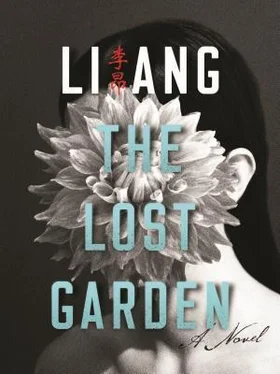“The Sino-Japanese War broke out in 1894. This is now 1952. So tell me, if you were born in the last year of the First Sino-Japanese War, how old are you?”
She had already memorized her multiplication tables, so simple addition and subtraction were no problem.
“Fifty-eight,” she said and began to laugh, her eyes still filled with tears.

He obviously didn’t know when the First Sino-Japanese War had taken place, so when he heard her say she was born in the last year of the First Sino-Japanese War, he said, without thinking, “Indeed!”
She didn’t correct him. Rather, she asked:
“Why do you say I was born in the last century?”
“Because there aren’t many girls like you these days.” He thought for a moment, then added: “You’re too smart and, I’m sure, very competent.”
After he’d gotten to know her better, she asked him the same question, and he’d said:
“I wasn’t wrong. You’re as competent as you are precisely because you were born into that family. You have the mannerisms of the matriarch of a large clan.”
After they’d been married many years, she asked him again:
“Do you still feel that I was born in the last century, the end of the last century, during the First Sino-Japanese War?”
This time he merely looked somberly out the window without answering.

… You can say you were born at the end of the First Sino-Japanese War if you want to. The war broke out in August 1894. In September, the Manchu court lost a battle in the Yellow Sea. On the twelfth of February in the following year, 1895, the Japanese defeated the Northern Fleet and Ding Ruchang committed suicide. On the seventeenth of April, the Treaty of Shimonoseki was signed, ceding Taiwan and the Penghu Islands and the Liaodong Peninsula to Japan for thirty years. On May twenty-fifth, Taiwan declared itself the “Democratic Republic of Taiwan,” with Tang Jingsong as its first president. Tang fled the island on the sixth of June. In October, the Battle of Guangzhou was lost, and Sun Yat-sen fled to Japan. During that same month, Japan crushed all opposition in Taiwan …
The letter was written in Father’s simple and concise Japanese, and touched upon his rereading of modern history in his old age. The more he thought about these major events, the more he felt that, at some level, his daughter hadn’t necessarily been wrong when she said she was “born in the last year of the First Sino-Japanese War.”
Yinghong finished her father’s letter from home with tears clouding her vision. Snow fell heavily outside her New York window, the worst snow-storm the city had seen in half a century, according to meteorologists. As dusk settled in, large, dry snowflakes kept falling, and as the snowfall continued, it increased to the point where it was a wall of shifting white, a haze that blurred heaven and earth.
In her mind, that afternoon in Flowing Pillow Pavilion was a clearer and more concrete image than anything else she had seen in her third year at school. More than a decade had passed, and now, as she stood there watching snow fall on New York, the passage of years merged with her memories, creating a picture more detailed than those memories, until they were no longer merely impressions of things seen by a third-grade girl.
Father had his back to the light. His living quarters faced south, looking out on a large lotus pond. In late October in central Taiwan, the sun set slightly to the south, which meant that Lotus Garden, built at the foot of a hill, blocked the sunlight shining westward, casting shadows on one side of the garden. Early autumn scorching heat, what the locals call the autumn tiger, was not to be taken lightly, and the garden was brightly lit; Flowing Pillow Pavilion, too, was, for the most part, washed in sunlight.
Father was in his room, in which a warm, yellow glow from the sunlight slanted in through windows shaped like two fans with overlapping sections. He sat on a Chinese-style armchair with his back to the window. He was only in his forties, and, though he was gaunt and pale from a long illness, he was still an undeniably handsome man. Deep-set eyes so typical of the Zhu family were lusterless. A high nose bridge and full lips were set off against an angular face with high cheekbones that seemed even more prominent because of his bony features.
She had always thought her father was tall and slender.
When she was in high school, a lesson in her Chinese literature textbook dealt with A New Account of Tales of the World . One day her father, struck by a sudden whim, took out an ancient-looking book lying flat on a carved sandalwood bookcase; it was a woodblock edition of Wondrous Tales of the World printed on bamboo paper. The bound cover looked well worn and the thread in the covers was coming loose, all signs of frequent use.
“It should be in the language section,” Father mumbled to himself.
He opened the book to reveal comments and annotations in vermillion ink that filled the yellowed pages, like red flower petals lodged between the lines. Flipping back and forth, he made the flowers flutter among the inky black characters.
“No, so then it must be …”
Quickly he turned to “Wit 25” and pushed the book over to Yinghong, who began to read word-by-word lines that had been punctuated with vermillion ink.
“Sun Zijing, when he was young, had wanted to become a hermit, so he said to Wang Wuzi that one should use a rock as a pillow and flowing water to rinse one’s mouth. But it came out incorrectly as ‘using a rock to rinse the mouth and sleeping on flowing water.’ Wang objected by saying that water could not be used as a pillow and that a rock cannot rinse one’s mouth. Sun retorted that one could use flowing water as a pillow in order to wash one’s ears and a rock to rinse one’s mouth in order to sharpen the teeth.”
Yinghong let out a soft cry. As a little girl, she had once sat on her father’s lap and listened to him explain the origin of “Flowing Pillow Pavilion”: using flowing water as a pillow. How can that be done? she recalled her father asking. Back then she’d hated it when Mudan dragged her up to a red wooden bucket and made her squat down to wash her hair, so she answered without thinking:
“Sleeping on flowing water means you never have to wash your hair.”
He roared with laughter. Unlike other people she’d seen laugh by cracking open their mouths and making tiny sounds, teeth still hidden behind stretched lips, her father would open his mouth wide to show his white teeth, and release loud, clear laughter, a sign of true delight.
His laughter stopped her from discovering the true meaning of “using flowing water as a pillow” until that afternoon, when she held the ancient edition of Wondrous Tales of the World in her hands. With a cry of surprise, she said:
“So it meant to use flowing water to rinse your mouth and pillow your head on a rock, but he made a mistake and reversed the two.”
In high school, Yinghong was slightly over five feet tall, which placed her seat in the middle of the classroom. But a slender figure made her seem much taller. Standing by the bookcase with the thread-bound copy of the Wondrous Tales of the World , she was only half a head shorter than her father.
So he was not particularly tall after all, and could only be considered a man of medium height among people of his generation. But he favored Japanese-style dress, a locally made cotton gown in a grayish blue. When he walked down the uneven verandah of Flowing Pillow Pavilion, he had to hike up the hem of his robe with one hand. Wind around the low hill in the open space would then be able to travel freely inside his robe, puffing it up enough that his normally gaunt body looked pleasingly trim and slender.
Читать дальше













